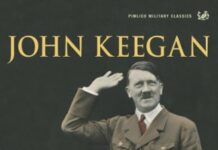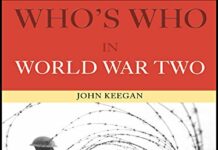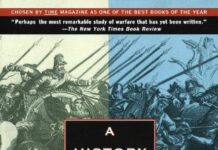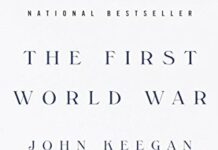
Ebook Info
- Published: 2007
- Number of pages: 208 pages
- Format: PDF
- File Size: 0.69 MB
- Authors: John Keegan
Description
One of the greatest historians writing today gives us a defining portrait of the incomparable Winston Churchill In his landmark biography of Winston Churchill, acclaimed historian John Keegan offers a very human portrait of one of the twentieth century’s enduring symbols of heroic defiance. From Churchill’s youth as a poor student to his leadership during World War II, Keegan reveals a man whose own idea of an English past—eloquently embodied in his speeches—allowed him to exhort a nation to unprecedented levels of sacrifice. The result is a uniquely discerning look at one of the most fascinating personalities in history.“The best military historian of our generation.” –Tom Clancy
User’s Reviews
Reviews from Amazon users which were colected at the time this book was published on the website:
⭐New Churchill’s biography sounds like another episode of the Simpsons – there are thousands of them. And yet this one is unique and worth reading. Why? Three reasons:a] It’s short and easy to readb] It covers military issues superblyc] It`s not excessively eulogisticI think some American anglophiles and some fervent Churchillians may be disappointed with the book. They might feel that WSC has received an unfair treatment. But Churchill, a human, has become a myth, particularly in North America. John Keegan writes that he was just a man, a strange man full of contradictions. “A devoted husband and father, he was, by the account of his favorite and deeply loving daughter, Mary, in her 1979 biography of her mother, difficult at home and often impossible (page 186).”Another contradiction of Churchill was one of a strategist. He had repeatedly stressed the importance of air power, more than any other civilian statesmen. Yet when it came to action, he could not resist the call of tradition and romance, and imagined that the Royal Navy could still assert the old supremacy unaided. The mistake of the Norwegian campaign was to be repeated in the Mediterranean, and still more disastrously in Singapore.For me, myself being a Russian, Churchill is a paradox: he was both Russophobe and Russophile. He often referred to the Russians as “crocodiles”. Keegan goes positive on Churchill’s 1946 “Iron Curtain” speech. I disagree: WSC demanded a unified Anglo-American front against Russia which he described as a triumphalist and expansionist victor state. Russia ostensibly was about to overrun the Western Europe in March 1946. It was manifestly untrue: not only Stalin had no desire to spread communism outside his “sphere of influence”, Russia had 20 million dead and was lying in ruins, its many European cities completely flattened, not unlike Hiroshima. In my view it was a sop to Truman and his band of hard-liners who had already decided on the policy of containment of Russia anyway. But it was Churchill who officially started the “Red Peril”.Yet when Germany suddenly attacked Russia on June 22, 1941 Churchill was the only statesman in the UK (or the US) who spoke about reaching out and supporting Russia. It contrasted drastically with his anti-communism and russophobia he had displayed only a few weeks before. Churchill said on June 22 1941: “I see the ten thousand villages of Russia, where the means of existence was wrung so hardly from the soil, but where there are still primordial human joys, where maidens laugh and children play. I see advancing upon all this in hideous onslaught the Nazi war machine, with its clanking, heel-clicking, dandified Prussian officers, its crafty expert agents fresh from the cowing and tying-down of a dozen countries. I see also the dull, drilled, docile, brutish masses of the Hun soldiery plodding on like a swarm of crawling locusts. I see the German bombers and fighters in the sky, still smarting from many a British whipping, delighted to find what they believe is an easier and a safer prey.”This passage demonstrates amply the most important thing about Churchill – he was a master of his language, a maestro of metaphor, and he used words as weapons of power. This brief but wonderful book gives us a good taste of that.
⭐In 1895 when his father died, the sickly and indifferent 21-year-old military cadet Winston Churchill was flat broke, the legacy of a father who was a compulsively extravagent wastrel. Lord Randolph had been syphilitic since early youth. His mother, American-born Jennie Jerome whose father was a stockbroker and part-owner of ‘The New York Times’, was always attracted to men other than her husband or her sons (Winston, born 1874, and John Spencer, born 1880). In modern terms, they were trailer trash; in Phoenix, Sheriff Joe would have set aside a bunk in his tent-city jail for Winston. But, instead of slums, Winston was born and brought up in Blenheim Palace, built 1704-22 and still one of the great estates of England. American ex-presidents get palatial libraries as their memorials; the British rewarded their leaders with mansions and great estates. Blenheim Palace was one of the finest, far better than the estates later awarded to Nelson and Wellington. Perhaps it was the milieu of Blenheim Palace, but Churchill matured into a man absolutely convinced of the majesty of the British virtues of patriotism, loyalty, courage and fair play. For him, being British meant manliness, courage, tenacity and ultimate moral decency. It resonated with the vigorous American spirit of Theodore Roosevelt and the beauty of the strenuous life. President George Bush is reported to keep a bust of Churchill in the Oval Office; perhaps as a reminder of the complete contrast to himself. Bush ducked the Vietnam War in the Texas Country Club Air Guard; Churchill eagerly sought war, even though he hated it. Like Ulysses S. Grant, Churchill was a gifted wordsmith instead of a stumblebum. He free-lanced as a journalist while serving as a British officer and was sometimes earning 20 times his military pay. He never stopped learning, he wanted facts, order, reason. His mother sent him crates of books while he was on duty, and he devoured them all. Gen. Sir Herbert Kitchener described him as a “medal-hunter” and “self-advertiser” who was “super-precocious” and “insufferably bumptious.” It was a good assessment. But, the public loved his books and even the Prince of Wales praised him. Whatever one thinks of Churchill, his career and successes are due to his own effort, intelligence, work and nerve. In brief, this is the story of a man who might well have ended up as a Soho souse, but instead became the greatest man of the past century. He did it through his own efforts, not because of Daddy’s friends, money or ability to pull strings. This book defines the character of a great man.
⭐A excellent straightforward summary of Churchill’s lifeThis book is an excellent, straightforward, summary of Churchill’s life and accomplishments. Being less than 200 pages long it does not contain the wealth of detail contained in longer biographies, such as the almost 1000 page biography by Martin Gilbert. Keegan substitutes extensive detail with analysis and an excellent summary of events, and I found this to be an excellent tradeoff. Keegan writes with clarity and gets to the heart of the matter.I read this book just after having finished Martin Gilbert’s one volume, 960-page biography and I found Keegan’s presentation to be more coherent and had a greater impact on me. I liked Gilbert’s book and recommend it, but to some extent I found that its extensive, year-by-year treatment, tended obscure Churchill’s contributions with a mind numbing level of detail. Keegan summarized these details and focuses on Churchill’s greatness. Gilbert also shows Churchill’s greatness, but sometimes I had to read between the lines to get a more rounded picture. There was no need to do this with Keegan’s book.I expected that John Keegan, being one of the premier military historians writing today, would have included more of Churchill’s involvement in WWI and WWII. These facets of Churchill’s life are discussed, but not in as much detail as I expected. However, the level of detail devoted to Churchill’s war years was in keeping with that of the presentation of the rest of his life, and I do not feel that providing only a summary detracted from the overall 5-star rating that I am giving to this book.
⭐A real admirer of this WW2 leader’s life and contribution, I have many books about his successes and failures. Thought this would be a bit of a different take. It was – and a very disappointing one, not up to this publisher’s standard at all. If it weren’t for all the bother – I would return it with a real nasty review….. Get a real bio – that’s been broadly rated – if you want to know a bit more about this British Great!!!
⭐Too short, but fascinating. It wet my appetite for a more robust bio, and there are many to choose from.
Keywords
Free Download Winston Churchill: A Life (Penguin Lives) in PDF format
Winston Churchill: A Life (Penguin Lives) PDF Free Download
Download Winston Churchill: A Life (Penguin Lives) 2007 PDF Free
Winston Churchill: A Life (Penguin Lives) 2007 PDF Free Download
Download Winston Churchill: A Life (Penguin Lives) PDF
Free Download Ebook Winston Churchill: A Life (Penguin Lives)




